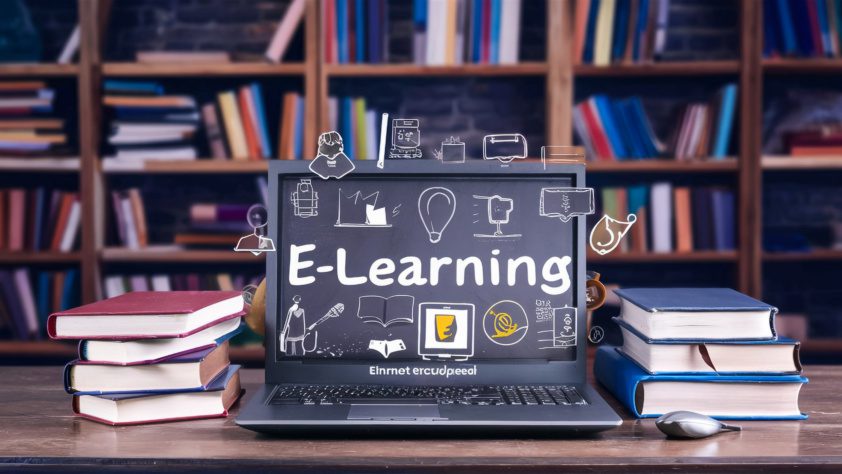Education is one of the key directions of human activity, which should constantly change and adapt to modern realities. Instead of standard lessons in classrooms with a blackboard, young students and adult employees have the opportunity to acquire new theoretical knowledge and practical skills remotely, according to a flexible schedule, and at any time. One of these solutions is the Learning Management System, which also offers new, more personalized, and interactive forms of presentation of educational material.
In this article, you will learn more about LMS, what its components are, and why a large number of well-known companies and entrepreneurs are increasingly paying attention to this form of online learning.
Learning Management System Explained: What You Need to Know
LMS (Learning Management System) is a software that allows you to create, schedule, and build a plan for online education and training. Also, it allows you to provide students with access to educational materials on the platform.
The Learning Management System also provides the platform owner with the opportunity to track the success of their own students, and the degree to which they have completed educational courses. LMS makes it possible to host various types of educational content: from text textbooks to video lessons. A student also has the possibility to pass interactive online tests and get the result immediately at the end.
Various government organizations, enterprises, private entrepreneurs, educational organizations, etc., are among those who introduce online learning at the expense of the LMS system.
What Makes Up the Modern Learning System
- User-friendly interface – each LMS platform has a user-friendly interface that allows you to easily navigate the site and the educational content provided on this platform.
- Data tracking and analysis – in this way, the LMS allows site administrators and those who learn on the platform to track the course completion process.
- Catalog and Course Management – LMS provides platform administrators with the ability to manage catalogs of educational content, providing students with a more personalized learning experience.
- Certificates – they are a mandatory part of training courses. The administrator issues certificates to students as evidence that they have successfully completed the course.
- Educational process gamification – it has been proven that the gamified form of education increases the student’s incentive to acquire new knowledge and skills. Instead of conducting traditional lectures and assigning homework, students learn the educational material in the format of a game: they pass different levels, and receive “stars” or other prizes. This approach is effective not only for teaching children but also for adult workers. Thus, according to Statista, 90% of people between the ages of 16 and 24 are fond of computer games.
- Process automation – LMS thus automates repetitive and monotonous processes, such as combining students into groups, deactivating users, etc.
- AI implementation – artificial intelligence, as the latest addition to educational platforms, optimizes their work and offers the students educational topics that may interest them, based on the material already covered.
Why LMS Is a Must-Have for Educational and Business Success
Today, many companies pay attention to the LMS system, because it provides both students and educators with such a number of advantages, which we will talk about further.
Companies receive income from the Learning Management System, primarily, due to the funds that users pay for online training courses. In addition, by introducing online courses instead of traditional classes, the organizer saves money on printing paper textbooks. The student themselves spends less money and time to get to the designated place of study because they can take online courses literally from home, a coffee shop, or another convenient place.
Based on the previous point, the student has a flexible, personalized work schedule, which allows them to learn new knowledge and skills quickly and without missing lectures and practicals. In particular, if it is a gamified form of learning that can increase the level of involvement and interest of the student in the online course. According to statistics from Gitnux, gamification of the educational process increases the interest of students by 60%.
Thus, the student does not have to appear in the class at a clearly defined time. If it is an online course, for example, without the involvement of online lectures, the student can watch videos, read educational materials, and take tests at any time convenient for him, without relying on standard rigid schedules.
Thus, with the help of the Learning Management System, it is possible not only to teach students but also to carry out onboarding of newcomers at work, to conduct training for employees who maintain their work skills in form. As for various industries, LMS is used in such areas as training salespeople in stores, learning how to handle electrical equipment, learning how to behave in the workplace to avoid bullying, etc. For example, the EdApp LMS platform allows organizers to create convenient custom online courses for different audiences and already on the aforementioned topics. This platform contains tools for creating interactive educational content that meets the SCORM (Sharable Content Object Reference Model) standard, intuitive templates for creating online lessons, and built-in artificial intelligence that allows you to create online courses. EdApp also includes the ability to create platforms that allow students to study on a smartphone, and create microlearning courses. Also, on this platform, course authors can track and analyze the success and completion of courses and receive feedback from students.
A Real-Life Showcase: Exploring Our LMSExample
Our TuneLab developers already have experience working on LMS for various customers. Learning Management System for those who want to work in law is an example of our work.
We developed an online platform where clients can easily and quickly buy courses and training documents/materials on the platform, where they can start their training. Each course contains a certain number of modules, and the system monitors and tracks the progress of users using internal trackers.
LMS for Lawyers is a convenient and flexible training platform for those who take courses at it. The user registers his account on the platform, with the help of which he can independently choose one or more training courses, pay for them with a credit card, and take them independently at any convenient time. Users also have access to previews so they can better understand what they are choosing for themselves.

Learning Management System, commonly known as LMS, has revolutionized online learning for both learners and course providers, including educational institutions, businesses, etc. Learning Management System offers a versatile and fast solution that meets the needs of different users thanks to convenient settings. So, for example, students receive educational materials at any place and time. Teachers and administrators, meanwhile can track the progress and success of students in courses, which allows them to analyze the courses themselves and improve them. In addition, courses using LMS can be conducted both in combination with face-to-face training and conducted separately.



